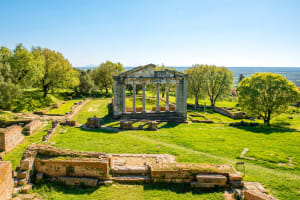





Albania is a small country located in Southeast Europe, on the Balkan Peninsula. It is bordered by Montenegro to the northwest, Kosovo to the northeast, North Macedonia to the east, Greece to the south and the Adriatic Sea and the Ionian Sea to the west. Tirana is the capital and largest city of Albania, and Albanian is the official language.
Albania has a population of around 2.8 million people, and the majority of the population is Albanian, with small minorities of Greeks, Macedonians, and Roma. The country has a long history, with traces of human settlements dating back to the Paleolithic era. Albania was part of the Ottoman Empire for over 500 years, until it declared independence in 1912.
Albania has a Mediterranean climate, with mild, wet winters and hot, dry summers. The country is known for its beautiful coastline, which stretches for over 300 km along the Adriatic and Ionian seas, as well as its mountainous interior, which is home to several national parks and protected areas.
The Albanian economy has undergone significant transformation since the fall of communism in 1991, transitioning from a centrally planned system to a market-oriented economy. The country is known for its agricultural production, particularly of olives, citrus fruits, and grapes. Albania is also rich in natural resources, including minerals such as chromium, copper, and nickel.
Albania is a secular state, and the majority of the population is Muslim or Orthodox Christian. The country has a rich cultural heritage, with influences from Illyrian, Greek, Roman, and Ottoman civilizations. Albanian cuisine is also diverse and flavorful, with influences from Mediterranean and Balkan cuisines.
Despite progress in areas such as democracy, human rights, and economic growth, Albania still faces challenges such as corruption, organized crime, and emigration of its citizens seeking better opportunities abroad.
National holiday
Independence Day, 28 November (1912), also known as Flag Day
Telephone Code
355
Local Emergency Phone
Ambulance: 17; Fire: 18; Police: 19
Vaccinations
An International Certificate of Vaccination for yellow fever is required for travelers arriving from countries with a risk of yellow fever transmission and for travelers having transited through the airport of a country with risk of yellow fever transmission. See WHO recommendations.
Climate
Mild temperate; cool, cloudy, wet winters; hot, clear summers; interior is cooler and wetter
Currency (Code)
Leke (ALL)
Electricity/Voltage/Plug Type(s)
230 V / 50 Hz / plug types(s): C, F
Major Languages
Albanian 98.8% (official), Greek 0.5%, other minority languages
Major Religions
Muslim 56.7%, Roman Catholic 10%, Orthodox 6.8%, other minority religions
Potable Water
Opt for bottled water
International Driving Permit
Suggested
Road Driving Side
Right
Tourist Destinations
Porto Palermo Castle; Valbona Valley; Apollonia; Saranda; Tirana; Himare; Berat; Shkodra; Pindus Mts. & Dinaric Alps; Kruje; Butrint; Gjirokastra
Major Sports
Soccer, basketball, volleyball, handball, boxing
Cultural Practices
Albanians will usually save gifts to open in private. Wrapping them nicely is a good idea.
Tipping Guidelines
Rounding up the bill at restaurants is fine, unless the service was outstanding, in which case, a good tip will be much appreciated. Taxi drivers do not expect a tip, but if they help with your luggage and provide you with tourist information, a tip would be appreciated. Tipping the housekeeping staff is not necessary but appreciated.
Souvenirs
Woven kilim rugs, alabaster, copper crafts, leather footwear, perfumes
Traditional Cuisine
Tavë kosi — a dish of lamb, or occasionally chicken, and rice baked with a mixture of yogurt and eggs and added to a roux of wheat flour and butter
Country code top-level domain
.al
Geography
Area
total: 28,748 sq km
land: 27,398 sq km
water: 1,350 sq km
Climate
mild temperate; cool, cloudy, wet winters; hot, clear, dry summers; interior is cooler and wetter
Natural resources
petroleum, natural gas, coal, bauxite, chromite, copper, iron ore, nickel, salt, timber, hydropower, arable land
People and Society
Population
3,101,621 (2023 est.)
Ethnic groups
Albanian 82.6%, Greek 0.9%, other 1% (including Vlach, Romani, Macedonian, Montenegrin, and Egyptian), unspecified 15.5% (2011 est.)
Languages
Albanian 98.8% (official - derived from Tosk dialect), Greek 0.5%, other 0.6% (including Macedonian, Romani, Vlach, Turkish, Italian, and Serbo-Croatian), unspecified 0.1% (2011 est.)
Religions
Muslim 56.7%, Roman Catholic 10%, Orthodox 6.8%, atheist 2.5%, Bektashi (a Sufi order) 2.1%, other 5.7%, unspecified 16.2% (2011 est.)
Population growth rate
0.19% (2023 est.)
Government
Government type
parliamentary republic
Capital
name: Tirana (Tirane)
Economy
Economic overview
future hopeful EU member state; oil and gas exporter but investing toward a “blue economy”; COVID-19 and earthquake economic disruptions and declines; experiencing high debt and account balances; strengthening private sector growth and public sector trust
Real GDP (purchasing power parity)
$40.822 billion (2021 est.)
Real GDP per capita
$14,500 (2021 est.)
Agricultural products
milk, maize, tomatoes, potatoes, watermelons, wheat, grapes, cucumbers, onions, apples
Industries
food; footwear, apparel and clothing; lumber, oil, cement, chemicals, mining, basic metals, hydropower
Exports
$5.612 billion (2021 est.)
Exports - partners
Italy 45%, Spain 8%, Germany 6%, Greece 5%, France 4%, China 4% (2019)
Exports - commodities
leather footwear and parts, crude petroleum, iron alloys, clothing, electricity, perfumes (2019)
Imports
$8.004 billion (2021 est.)
Imports - partners
Italy 28%, Greece 12%, China 11%, Turkey 9%, Germany 5% (2019)
Imports - commodities
refined petroleum, cars, tanned hides, packaged medical supplies, footwear parts (2019)










